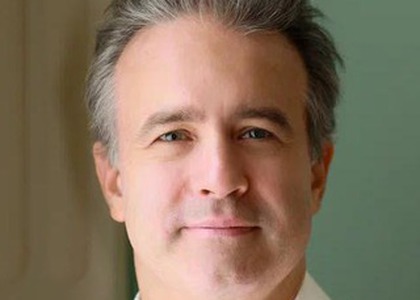> Interviews

Interview with pianist Alexei Volodin
Alexei Volodin is the pianist inaugurating the new Steinway & Sons piano at the Radio Hall tomorrow, April 19th, with the National Radio Orchestra, in a new concert in the Brahms series. Audiences will be able to hear Johannes Brahms' Concerto No. 1 for piano and orchestra, followed by the Symphony IV by the same composer, conducted by Daniel Raiskin.
You are the first soloist to perform on the new piano at the Sala Radio - so, I'd like to know, how would you describe this instrument?
I am happy to realize that the new instrument purchased here is excellent. I think it has a lot of potential from pianissimo to fortissimo. I have to get used to it a little bit, I'm very happy to work on it - it has to be played, because it's brand new, but I have high hopes for it. It's a new instrument, it has to be worked on a little bit, it has to be played a few times and then it will open - like opening a bottle of wine, which has to breathe a little bit.
How important is a new piano in the life of a concert hall? I ask because there is a preconception that an older piano is of quality - which is usually not true, as the public opinion goes.
A good piano is important in the life of a concert hall! Sure, if it's a new one, that's fine. People tend to idealize the past. Indeed, many very good instruments are old - perhaps the ivory ones, perhaps they had a more custom sound. I guess it depends on each instrument in each hall. There is, I agree, a general opinion that pianos made many years ago are better. But that's not always the case.
What does a Steinway piano offer?
That's a difficult question. What's great about Steinway instruments in particular is the high standard to which all their instruments are made. There are other fantastic brands out there, but most of them have a wide range, from good to not so good. With Steinway you can be pretty sure you're getting a very good instrument - some of them great, of course!
How does this Brahms Piano Concerto fit into your repertoire and how do you see it as a stand-alone work?
I've been playing it for many years, and I certainly hope to play it for the rest of my life, because it's one of my favourite pieces, one of the most emotional, wonderful and brilliant pieces written in this genre. It is extremely symphonic, extremely challenging, extremely romantic at its core, full of incredible, soulful melodies and incredible symphonic developments. It is a great challenge and a great pleasure for any musician to return to this work.
How would you describe Brahms' place in the consciousness of the music-loving public?
I think I have nothing to add to what is already known: he is one of the most important composers in the world's musical culture and in the so-called "German Romanticism". He has been played continuously - he is very important, very influential.
How do you relate to his music?
It is very important in my life too because I remember since I was a child, a schoolboy, I remember discovering his pieces - first of all the Piano Concertos, then a little later the solo pieces - they made a big impression on me, I always dreamed of playing them. I love his music and I remember times when, as a teenager, I wasn't perhaps as close to him, but I later returned to Brahms - the more I matured, the closer I got to him. I can't say he gets closer to me, it's up to us to get closer to composers - he's always there!
In this respect, we know that during his lifetime he was compared to Beethoven. How do you see him in the context of European music history?
You're absolutely right, I don't think anyone in their right mind would compare themselves to Beethoven - certainly, it would be a huge honour for a composer to be seen or felt to be the continuity of that genre, that style, that tradition that is so important. That's certainly how Brahms is seen. It started, I think, with his first Symphony, dubbed "Beethoven's Tenth" - so we, now, cannot take him out of that tradition; and why would we? It's such a natural thing. I don't see Brahms as a rival to Wagner, as some people see him. For me, he certainly continues a vector - which is visible not only in the Piano Concertos or the Symphonies, but also in the Piano Sonatas, where we can see him as the successor of this huge tradition.
You mentioned that rivalry between Brahms and Wagner - I for one have always thought that they both continued some aspect of Beethoven's creation.
Sure, this is very obvious to us now, but to contemporaries... they say that a great thing can be seen from a distance - I don't know exactly how to translate the saying. Many things become obvious with the passage of time. Sometimes people see huge differences between Brahms and Tchaikovsky, for example. Maybe it wouldn't have been a compliment to Tchaikovsky to say they have something in common, but now we see that they are not such rivals, they are not antipodes in the history of music, on the contrary, they have many things in common. Of course, each creator is different in some dramatic way, but now, with the passing of the centuries, I think it's unimportant - for me, personally, it certainly is unimportant. I certainly come from the same root, but the way each musical tree develops is very different, depending on the creative personality of each one.
University of Bucharest, Faculty of Foreign Languages and Literatures, MTTLC, year I
Corrected by Silvia Petrescu














